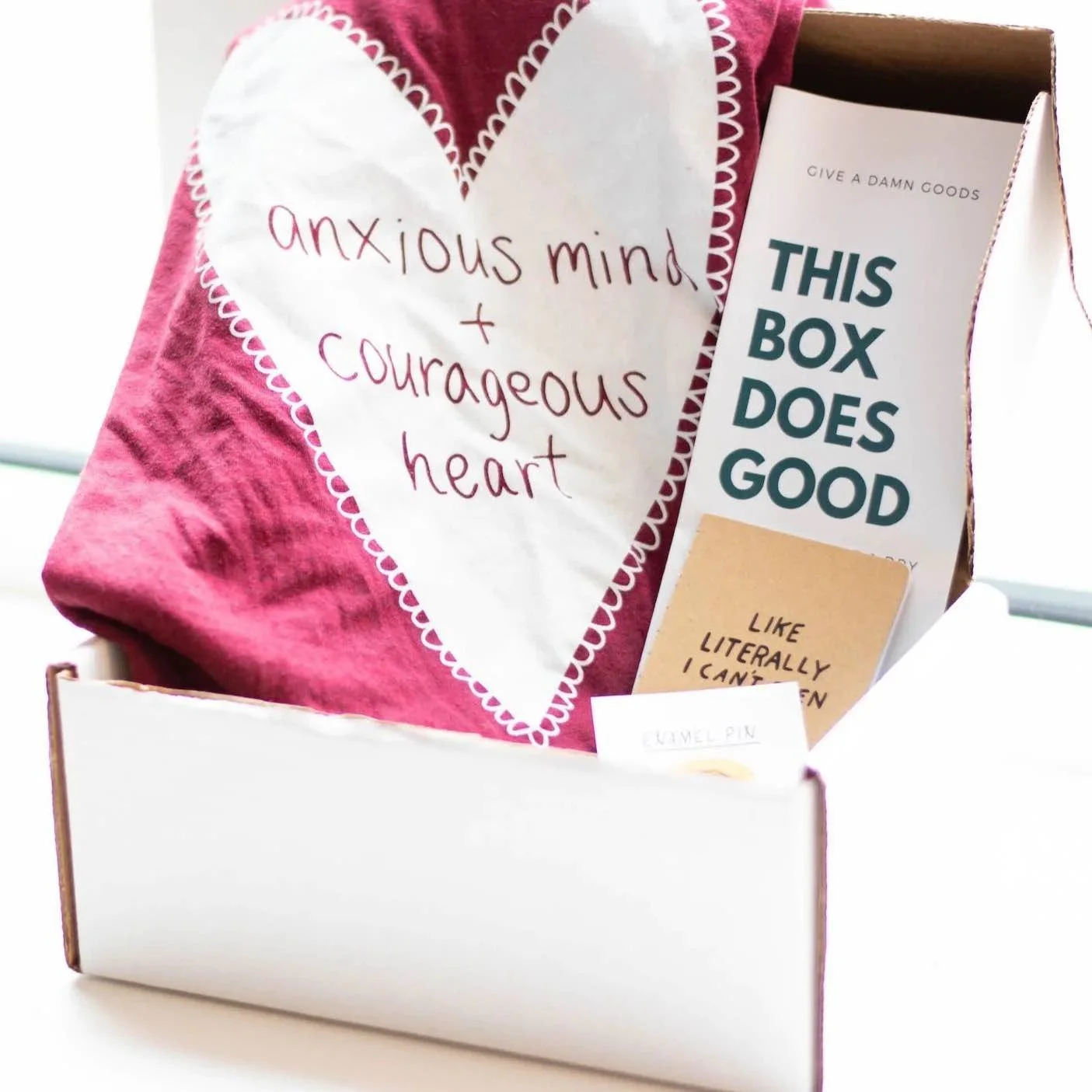8 Things Not to Say to Someone With Anxiety
During October it is World Mental Health Day! Try and take part in the conversation today whether you struggle with mental health or not. It's important to learn and talk about mental health regularly.
This post provides some tips on how to talk to people with anxiety by exploring things not to say to an anxious person and phrases to say instead.
You will definitely feel some angst in this post because, as someone who struggles with anxiety, I’ve been told the wrong thing SO many times.
But I’m writing this because it’s important to educate people on how individuals struggling with mental health feel, what to say, and what not to say.
If you're the family member or supportive friend of an anxiety sufferer hopefully these tips help you get a better grasp on how to talk to anxious people!
While these tips are based on my personal experience as an anxious person, it's also important to consider the help of mental health experts.
If you feel your own symptoms or your loved one's anxiety symptoms are more severe, consider speaking to a mental health professional.
Seeking professional help is nothing to be ashamed of. I think it's a sign of great courage. Anxiety experts and mental health professionals can help provide you with some great tools for working through anxiety.
Be sure to read to the end to learn a few phrases that you SHOULD use instead when speaking to your loved ones struggling with anxiety or other mental health struggles.
Tips for Talking to Anxious People
These are a few helpful things to consider when talking to a loved one struggling with mental health.
It's important to listen to how the person feels and avoid phrases that invalidate a person's anxious thoughts or feelings.
Consider asking open ended questions. Sometimes this can help identify the source of anxiety and gives the anxious individual time to reflect on their feelings.
Consider doing small things that might help calm them down like making the person a cup of tea, bringing them a snack, or asking if they'd like a hug.
Avoid giving unsolicited advice during times of severe anxiety. While advice can be said with good intentions a lot of anxious people just want someone to be there with them in the moment and listen. Advice can sometimes be overwhelming or not the best idea for that specific person.
Make sure the environment you're in is a peaceful environment where the individual is comfortable talking about mental health struggles. Most people tend to want to talk about anxiety in a private setting.
8 Things Not to Say to Someone Struggling With Anxiety.
As an anxious person myself, these are things that I personally do not find helpful. While I know my loved ones said these things with the best intentions, sometimes these phrases minimized felt like they were minimizing what I was going through.
It’s not a big deal.
This phrase makes me so angry when I hear people say this to someone struggling. Sure, it may not be a big deal to you personally, but to the person struggling, in the moment, it is a big deal.
By saying it’s not can cause them to feel like their feelings are not valid and cause a feeling of fear when reaching out to others for emotional support.
Try to find phrases that help validate what they're going through and let them know that you're there to support them.
Think positive. Be more optimistic.
I’ve heard this one so often and I don’t even know where to begin. If people could just turn off their anxiety and depression, I think they would.
But it’s not that easy with anxious thoughts. I can’t just hit a switch and be happy. It can be challenging to encourage optimistic people to be mindful of my anxiety.
Don’t worry about it.
Again. If I could flip the switch and turn it off, I would. But I can’t, so please don’t minimize my feelings.
Anxiety/depression isn’t real. It’s all in your head.
This one really frustrates me too. So many people struggle from anxiety and depression, it's estimated that 1 in 5 adults in United States experience a mental illness.
However, a lot of people still do not understand because they haven’t experienced battling mental health for themselves or they don’t know anyone who is open about their struggle.
Anxiety is real and comes in many different forms such as mood swings, panic disorder, specific phobias, negative thoughts, having a hard time with social situations, physical symptoms and more.
Anxiety looks different for everyone. This is another reason why conversation is so important to help people understand.
You don’t need medicine for anxiety or depression.
Some people do need medicine and that is okay. Pill shaming is a huge issue. Mental illness is real and sometimes requires medical help.
A treatment plan can vary from person to person and that is okay. Try to be supportive of your anxious loved ones who are on meds if that is what works best for them.
If you just…..
Oh I’ve heard this too many times. If you just eat healthier. If you just exercise more. If you just spend less time on social media. If you just started yoga. If you gave up coffee. The list goes on..
Sure these healthy practices may minimize the effects of anxiety or depression, but they’re not necessarily a solution. And by suggesting a large lifestyle change to someone already struggling, that can add onto their stress.
You don’t need a therapist. You have me.
First of all, I appreciate when friends try to act like a therapist and show that they are trying to be supportive. However, let’s be real. Our friends don’t know what they’re doing.
This is one I often hear from parents too. Therapists are great because they are a neutral party. Assuming you find the right therapist, there is no judgement, they don’t turn the conversation back around on themselves or try to relate to your problems, but they listen and bring validation to your struggles.
They help identify the root cause of the issue and help patients work through that. I was against talk therapy for a long time, but after finding the right therapist, I am forever changed!
Just breathe.
If it was just that simple I would. For me personally, an anxiety attack is way more than just breathing. It’s chest pain, sometimes stomach pain, racing thoughts, shortness of breath, and to just breathe is a lot harder than you think.
What people without mental health issues typically don’t understand is that anxiety and depression can consume you. While it’s heavily mental, it can also cause physical pain and discomfort as well.
5 Phrases to Say to Your Anxious Friend Instead
These phrases are all great because it helps reassure the individual struggling that they are not alone and that it is normal. Also, sometimes depending on the situation, it’s okay not to say anything at all, but just to be there in the moment for that person struggling.
Your feelings are valid.
In my personal experience this phrase helped me feel supported. I felt like I was being listened to and reminded me I didn't have to have a fear of judgment from the individual I was talking to.
What can I do for you?
This phrase helps your loved one know that you are there for them and willing to help. It can also be a good way for the anxious person to take a step back and reflect on what they need.
It’s okay not to be okay.
This is another phrase that helped me feel validated. The reality is everyone goes through a tough time and sometimes the reminder of it's okay to not be okay can help people feel more normal.
I am here for you.
This phrase is a good reminder that the anxious individual is not alone. Social isolation is a common symptom of anxiety, so sending someone a quick text message or leaving them a message with this simple phrase can make a big difference.
What Do You Need?
This is something my therapist asks me and I think it's really helpful. This question makes the individual stop and reflect on what they need in that moment given how they're feeling.
Sometimes when we feel anxious we're in a flight response and more focused on surviving the moment, but not thinking about what is needed. This could be something like the person needs a nap, needs a snack, needs some alone time, or whatever is right for them in that moment.
Hopefully this guide helped you learn what not to say to an anxious person, provided you with some good phrases to keep in your vocabulary, and gave you some informative tips to make talking to someone with anxiety a little easier.
Keeping the conversation going around mental health is very important in ending the stigma. Don't be afraid to share your own mental health struggles or to start the conversation with others.
For more mindful tips be sure to explore more conscious lifestyle blog posts, follow The Honest Consumer on social media, subscribe to our newsletter, & check out the Ethical & Sustainable Brand Directory.


















